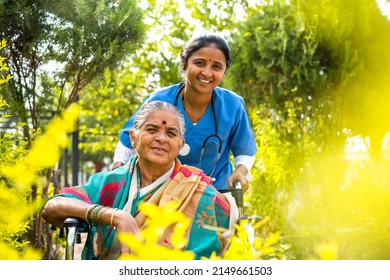
Elder Caretaker Course: Developing an Empathetic Career in Elderly Care
As the world is transforming at lightning speed in today’s age, the need for elderly caregivers is growing at a pace that was never witnessed before. With life expectancy on the rise and medical science improving by leaps and bounds, more and more individuals are living long and healthy lives. Longevity, however, is usually met with health ailments, mobility issues, and cognitive needs that require to be met by professionals. It is where an Elderly Caretaker Course steps into action, imparting facts, empathy, and technical expertise to the students to provide overall care to elderly people.
Why Elderly Care is Becoming Essential
The aged population all over the world is expanding more and more. World demographic studies have reported that by the year 2050 there will be almost one out of every six people on our planet aged 65 years and older. This population shift presents challenges to health-care industries but also opportunities for well-trained geriatric experts.
Old individuals usually suffer from long-term illnesses such as diabetes, arthritis, dementia, or cardiovascular illnesses. Besides illness, they may also suffer from loneliness, depression, and dependency on others for daily tasks. An Elderly Caretaker Course gives systematic training for dealing with all these different needs so that the caretakers may be able to cope with physical as well as psychological needs of the elderly.
Overview of the Elderly Caretaker Course
The Elderly Caretaker Course is meant for those who aspire for a career in elder care, professionally in the health sector or personally in their own households. The course covers a wide range of medical science, soft skills, and knowledge in the form of practical training.
Major Features of the Course
Geriatric Care Introduction
Study of the aging process.
Health ailments prevalent in advanced age.
Psychological and social issues of elderly people.
Basic Nursing and First Aid Skill
Taking blood pressure, temperature, and pulse measurements.
Basic first aid care in emergency cases.
Medical Knowledge: Experienced in being able to understand and assist with primary health care.
Patience and Empathy: Able to work with older patients who are slow in action or reaction.
Communication Skills: Effective and compassionate communication with the patients and their families.
Problem-Solving Skills: Immediate response to unexpected health or behavior problems.
Cultural Sensitivity: Openness towards the varied background and religion of the patients.
Career Opportunities Post-Course
completion of an Elderly Caretaker Course offers a range of career opportunities in medical and social service sectors. With aging care professionals being progressively in demand, certified caretakers can work as:
Hospitals and Clinics – As secondary personnel to physicians and nurses in geriatric units.
Old Age Homes – As resident caretakers to inmates of old age homes.
Rehabilitation Centers – To aid as helper staff for old patients to recuperate from surgery or illness.
Home Healthcare Services – Giving personal care at home for the elderly.
Non-Governmental Organizations (NGOs) – Involved in community programs for well-being for old age.
For those interested in foreign employment, elder care is a most sought-after profession in aging countries such as Japan, Germany, Canada, and Australia. Certification will go a long way in enhancing overseas career prospects.
The Role of Soft Skills in Elderly Care
Technical competence is imperative, but it’s the soft skills which make an effective caregiver. The elderly desire to be with someone, to be listened to, and to be treated with respect. Caregivers must listen carefully, speak kindly, and reassure. Patience is not a luxury; there are some elderly patients who ask questions over and over, forget, or resist assistance. A good caretaker must possess a combination of professional competence and a sympathetic heart.
Advantages of Pursuing an Elderly Caregiver Course
Low Unemployment: As the population ages, there is a regular need for trained caregivers.
Personal Satisfaction: Caring for the elderly is very rewarding, giving a sense of contribution and satisfaction.
Flexibility in Work: Caregivers can work full-time, part-time, or freelance, as one likes.
Family Help: In addition to professional advantages, the training also assists one in caring for one’s own elderly relatives effectively.
Career Path to Advanced Careers: The program can be a stepping stone to advanced health research, like geriatric therapy or nursing.
Caregiving Challenges and Why Training is Beneficial
Senior citizens also don’t come without challenges. There will be non-compliance by patients who want to be independent, or even emotional distress witnessing deterioration in health. Physical demands like patient manipulation or emergency handling are also problematic.
This is why proper training in the form of an Elderly Caretaker Course comes in handy. It empowers caregivers to be confident and capable enough with suitable strength, professionalism, and coping strategies to address such issues. The course usually involves stress management and caregivers’ self-care mechanisms so that their health and well-being are not compromised.
The Humanitarian Aspect of Elderly Care
Aside from work, old-age care has a humanitarian component. It is an aspect of every society that elderly people should be respected, but busy lives ostracize the elderly. Professional carers take a vital role in restoring dignity, independence, and quality of life for older citizens. The career is not just a career—it is a vocation driven by compassion and service to humankind.
Conclusion:-
The Elderly Caretaker Course is more than a syllabus; it’s the chance to find a fulfilling career and contribute something meaningful to society on a major level. It doesn’t only instruct one on how to deal with physical and medical requirements but empathy to create well-being emotionally as well. Where aging populations of seniors increasingly surround us today, professional caregivers are the unsung heroes who ensure aging not only lasts longer but also better.
Categories: Uncategorized